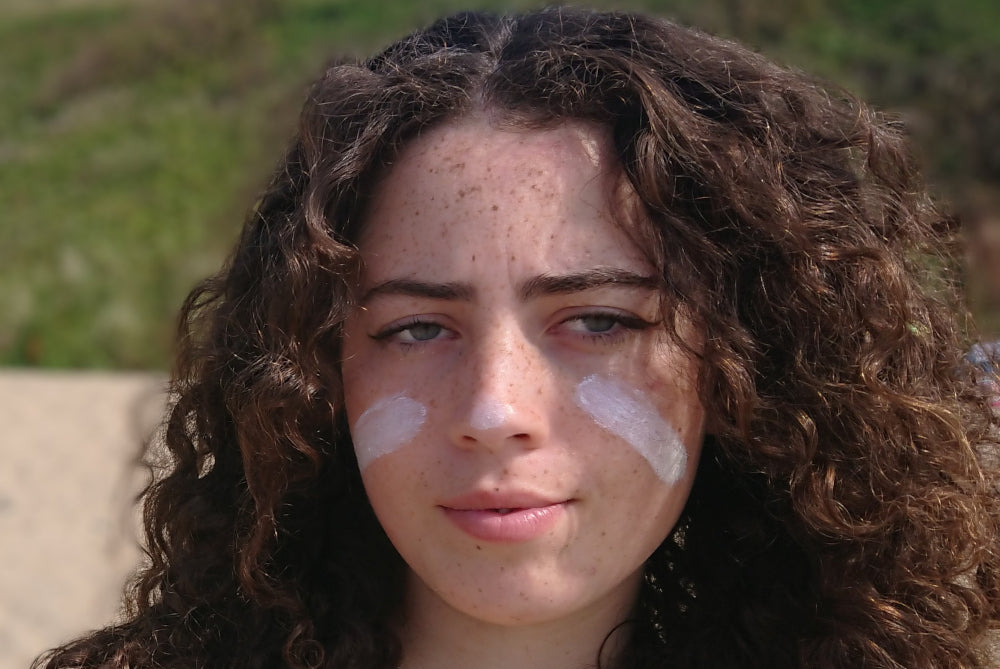Buy your weekday smoothies and get your weekend ones for free. (7 for the price of 5!)

This post might surprise you, especially coming from the makers of one of Britain’s simplest and most natural sunscreen brands. But if you’re thinking of switching from a chemical sunscreen to a natural one like Shade, it’s essential that you read this.
I originally wrote this post over ten years ago, wrapped in a thick scarf and my cosy Norwegian cardigan, still feeling the chill after watching my daughter and her friends swim in the bracing waters of Bantham Beach. At the time, we'd just received our very first negative review of Shade on Amazon.
Reading it, my heart went out to the family. They’d experienced sunburn after using our product and felt understandably upset and let down. They’d trusted Shade to protect them - and it hadn’t met their expectations. We’ve all been there: something we rely on doesn’t work the way we hoped. It stings.
That review stuck with me. And although thousands of families have had overwhelmingly positive experiences with Shade - some calling it a “godsend” - I felt it was important to share my original response publicly, in case it helps prevent others from going through something similar.
My Original Response to the Review
Thank you for your feedback. To date, we’ve only had a very small number of reports (just three at the time of writing) from customers who experienced sunburn while using Shade. Each case revealed a common theme: Shade wasn’t being used appropriately.
In one instance, the customer had been in and out of the pool during peak sun hours, relying on Shade to provide continuous protection. It’s important to clarify: Shade is not waterproof, nor is it a sunblock. It's a mineral-based SPF25 sunscreen and should be used with care and common sense.
Understanding SPF and How Sunscreens Work
SPF25 means you are protected for up to 25 times longer than you would be without sunscreen—under the same environmental conditions. It does not mean you can stay in the sun all day just by reapplying it.
This is a widespread misconception. Sun exposure is cumulative, and reapplying sunscreen does not reset the clock. SPF25 blocks approximately 96% of UVB rays - but that remaining 4% is still reaching your skin.
If your skin starts to feel like it’s burning, that’s your body’s way of saying: “Time to get out of the sun.” Sunscreen isn't a permission slip to stay exposed indefinitely. The smart move is to seek shade, wear protective clothing, or simply head indoors.
How Much Is ‘Enough’ Sunscreen?
For sunscreen to work effectively, it must be applied liberally. The recommended amount is about one shot glass full for an average adult body - and half a teaspoon for the face.
Using less dramatically reduces protection. For example, using half the recommended amount of SPF25 doesn’t give you “half the protection” - it can reduce the effective SPF to as low as SPF5. And remember: trying to avoid the “white cast” (caused by zinc oxide, our active ingredient) may result in under-application, which compromises effectiveness.
Other Factors That Affect Sun Sensitivity
There are several other things that can make your skin more sensitive to UV rays:
- Certain medications
- Reflective surfaces (like water, snow, sand, or even grass)
- High altitudes
These can all intensify your sun exposure, even if you're using sunscreen correctly.
Why So Many Families Choose Shade
We understand Shade isn't for everyone. But for many customers - especially those with sensitivities to synthetic ingredients - Shade has been the only sunscreen they can use. It's been tested to EU standards and proven to be a safe, broad-spectrum SPF25 sunscreen when applied correctly.
I’m genuinely sorry this particular customer had a negative experience, and I reached out to try and speak with them directly to understand more. Open communication helps us all learn and improve.
Final Thoughts: The Personal Responsibility of Sun Safety
When I take part in any risky activity - hiking, swimming, climbing - I assess the risks and prepare accordingly. The same goes for sun exposure. Sunscreen is just one piece of the puzzle. It's not a magic shield.
Sun safety requires awareness, responsibility, and respect for our own bodies. If you’re looking for a sunscreen that allows you to stay in intense sun exposure without additional protection, Shade might not be the right fit for you. And that’s okay.
Whatever sunscreen you choose, I truly hope it helps you and your family stay safe and enjoy the sun.
